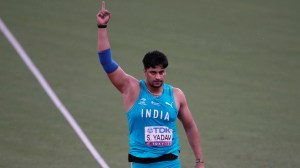Rights activists to fight ban on panel
JALANDHAR, Nov 15: The continuing debate on the efficacy of setting up a People's Commission in Punjab to probe police excesses during the m...

JALANDHAR, Nov 15: The continuing debate on the efficacy of setting up a People’s Commission in Punjab to probe police excesses during the militancy era was today carried to another plane as human rights activists from all parts of the country resolved to fight any governmental attempt to suppress or ban its functioning.
The rights activists dismissed the criticism of the commission as "meaningless" and "without any basis" and resolved to extend the debate on repression and rights violations by the state to the entire country for generating a cosmopolitan public opinion about the rights movement.
More than 300 delegates attended the seminar organised by the Committee for Coordination on Disappearances in Punjab to discuss the role of the People’s Commission.
The Co-ordination Committee — comprising various human rights groups in — Punjab was instrumental in the setting up the People’s Commission after documenting several cases of youths dying or disappearing in police custody during militancy. The Commission has already sent hundreds of notices to various Punjab police officers, summoning them to appear before the Commission in connection with rights violation cases. The next hearing is scheduled at Amritsar from November 28 to 30.
All the major political parties in Punjab, including the ruling Shiromani Akali Dal, the BJP and the Congress, CPI and CPM have opposed setting up of the Commission contending it would open old wounds and promote terrorism and communal hatred.
Setting the tone for the seminar, the convenor of the Committee for Coordination on Disappearances Ram Narayan Kumar said it was the refusal of the government to probe rights violations even when confronted with documentation by the committee that prompted them to set up the People’s Commission.
Any ban on the functioning of the Commission would be fraught with dangerous consequences, Kumar warned, and repeated his offer for full support if the government decided to set up its own statutory commission to probe the rights violations during the militancy era.
Retired Justice Bhushan Malhotra said the Commission was not performing the function of a parallel judiciary but was aiding justice. He claimed it was constitutionally impossible to ban the Commission as it would be a direct infringement on the fundamental right of speech and expression.
Justice Malhotra said only those fearful of indictment were criticising the Commission. He contended that justifiable punishment to some police officials who acted extra-judiciously could not demoralise a whole force as was being reasoned by critics.
Late human rights activist Jaswant Singh Khalra’s sacrifices will not go waste, Justice Malhotra added. Khalra’s widow, Paramjit Kaur, was present at the seminar. Calendars carrying photographs of late Sant Jarnail Singh Bhindranwale and Jaswant Singh Khalra, brought out by the Akali Dal, were put up for sale at the seminar.
Dr Anoop Saraya of the People’s Union for Civil Liberties demanded a judicial probe into the reasons behind the rise of terrorism and called for networking of the rights movements in different parts of the country for a coordinated action plan. Dr Saraya regretted that though the issue of rights violations was being raked up in Punjab and Kashmir, similar violation in the North-East were not being noticed.
Darshan Singh, president of the Samajwadi Janata Party, Punjab, called upon the rights organisations to be wary of the politicisation of the human rights issues. N.D. Panscholi of the Citizens for Democracy said the setting up of the Commission was aimed to empower the people against state terrorism.
Prof Satish Jain of JNU expressed concern over the civil liberties situation in the country and said the human rights organisations had a great role in highlighting these atrocities by proper documentation.
Shamsul Islam of Dishan Natya Manch felt that the committee members did not need to issue clarifications every day on the criticism from various quarters.
Photos



- 01
- 02
- 03
- 04
- 05




























